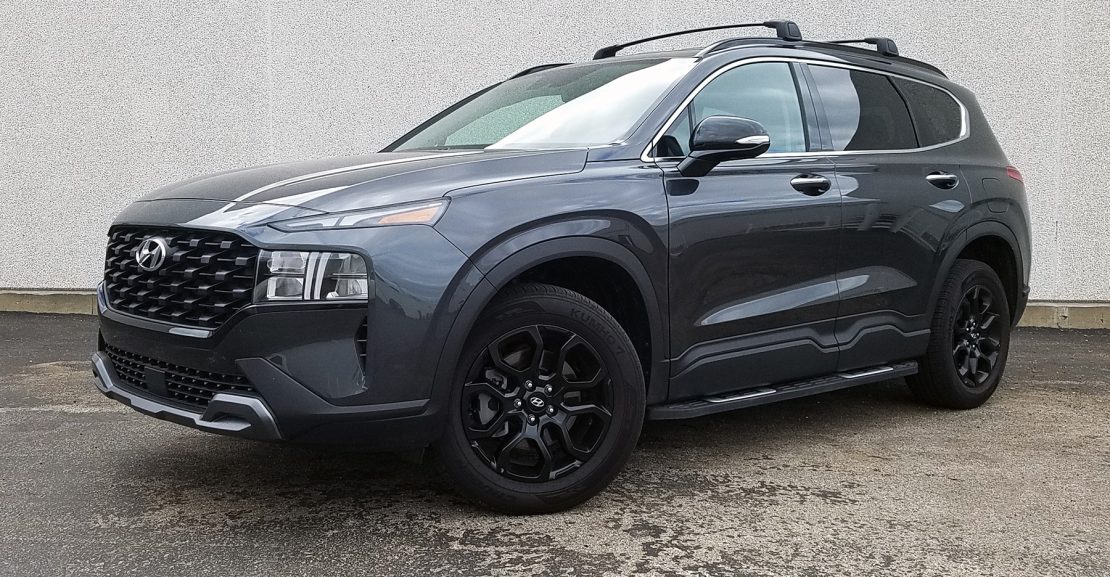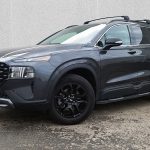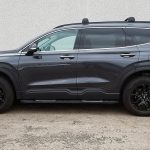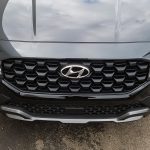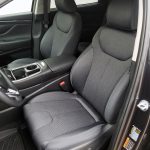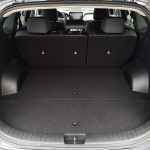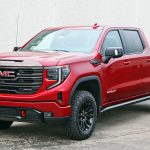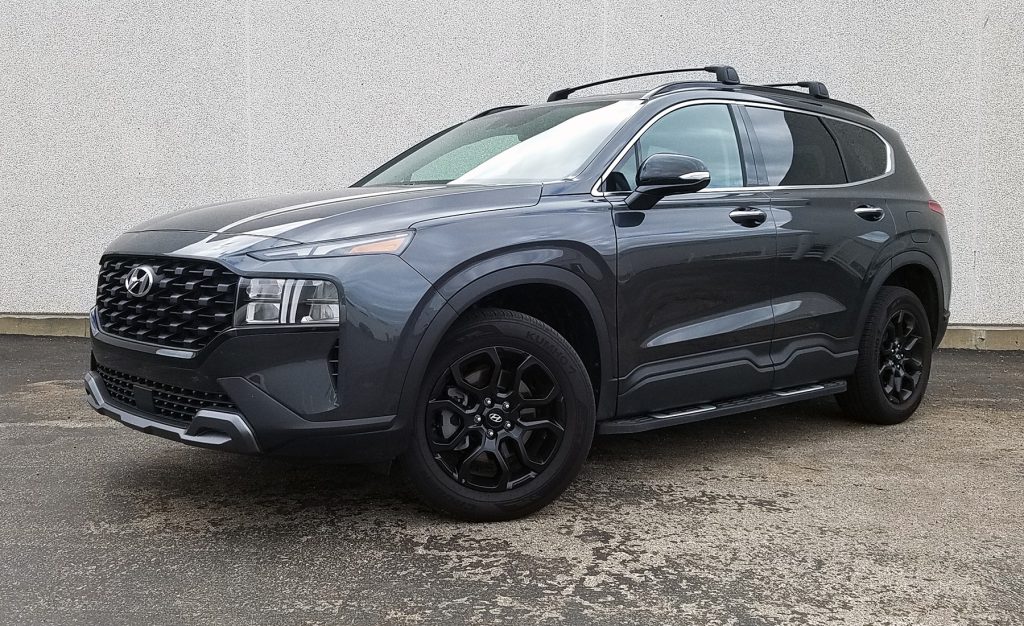
2022 Hyundai Santa Fe XRT
Class: Midsize Crossover
Miles Driven: 939
Fuel Used: 40.0 gallons
| CG Report Card | |
|---|---|
| Room and Comfort | A- |
| Power and Performance | C+ |
| Fit and Finish | B- |
| Fuel Economy | B |
| Value | B+ |
| Report-card grades are derived from a consensus of test-driver evaluations. All grades are versus other vehicles in the same class. Value grade is for specific trim level evaluated, and may not reflect Consumer Guide's impressions of the entire model lineup. | |
| Big & Tall Comfort | |
| Big Guy | A |
| Tall Guy | A |
| Big & Tall comfort ratings are for front seats only. "Big" rating based on male tester weighing approximately 350 pounds, "Tall" rating based on 6'6"-tall male tester. | |
| Drivetrain | |
| Engine Specs | 191-hp 2.5-liter |
| Engine Type | 4-cyl |
| Transmission | 8-speed automatic |
| Drive Wheels | AWD |
Real-world fuel economy: 23.5 mpg
Driving mix: 40% city, 60% highway
EPA-estimated fuel economy: 22/25/24 (mpg city/highway/combined)
Fuel type: Regular Gasoline
Base price: $34,000 (not including $1185 destination charge)
Options on test vehicle: Carpeted floor mats ($195)
Price as tested: $35,380
Quick Hits
The great: Value pricing; comfortable, spacious cabin for passengers and cargo
The good: Respectable level of standard features for the money; smooth ride quality
The not so good: Thick rear roof pillars impede visibility somewhat; mediocre acceleration; unimpressive fuel economy
More Santa Fe price and availability information
CG Says:
After undergoing an extensive update for 2021 that included freshened exterior styling, three new engines (including a hybrid powertrain), a revamped interior, and a top-line Calligraphy trim level, Hyundai’s Santa Fe 5-passenger midsize SUV gets a couple more noteworthy additions for 2022. One is a plug-in-hybrid powertrain, which uses the same turbocharged 1.6-liter 4-cylinder as the regular Santa Fe hybrid, but adds a larger battery pack and more powerful electric motor to net 261 total horsepower and an all-electric driving range of 31 miles.
The other new addition to the Santa Fe lineup is Hyundai’s attempt to keep up with current crossover-SUV fashion: the rugged-look XRT trim level. Apparently, lots of American shoppers want to take their everyday crossovers on off-the-beaten-path outdoor-adventure excursions—or at least look like they can—and manufacturers are catering to these desires. Among others, Ford has introduced a Timberline version of its Explorer midsize SUV, Honda now offers a Trailsport version of the Passport (and will soon offer a Pilot Trailsport), and Subaru has kicked off its new Wilderness sub-brand on both the Outback wagon and Forester compact SUV.
On the scale of “real capability” versus “just for looks,” the Santa Fe XRT’s additions fall mostly in the latter category. It gets dark-finish exterior-trim elements, dark-tone 18-inch wheels, beefy-looking lower door side finishers, roof-rack cross rails, skid plates, and side steps. There’s no raised ride height, all-terrain tires, fortified suspension, uprated powertrain, or even easy-clean upholstery or special interior trim.
Instead, the XRT is positioned as a value-leader offering—it sits square in the middle of the regular gasoline-engine Santa Fe lineup, above the entry-level SE and slightly better-equipped SEL models, and below the ritzier Limited and top-line Calligraphy trims. The XRT’s sole engine is the Santa Fe’s base 191-hp 2.5-liter 4-cylinder; the 281-hp turbocharged 2.5-liter four is offered only on the Limited and Calligraphy.
You can check out our previous reviews of a Santa Fe Hybrid Limited and Santa Fe Calligraphy for more info on the Santa Fe’s basic platform. The XRT doesn’t offer all the upscale features of the Limited and Calligraphy models—it has cloth upholstery instead of leather; an 8-inch infotainment touchscreen instead of the top-line 10.25-inch screen; and no 360-degree surround-view camera, upgraded audio system, or panoramic sunroof. Still, it comes reasonably well equipped with features such as heated front seats, a 12.3-inch digital gauge cluster, wireless device charging, keyless entry and starting, and adaptive cruise control with stop/go capability.
As expected, the XRT is notably slower than its upmarket siblings—the 2.5-liter 4-cylinder is fine in around-town driving, but struggles to provide adequate passing power on the highway. Our observed fuel economy was more or less on par with the EPA estimates, but, disappointingly, no better than we achieved in our Santa Fe Calligraphy with its much more powerful turbo engine. The 2.5 liter’s unremarkable performance might be the XRT’s weakest link—maybe Hyundai will see fit to expand the availability of the turbo 2.5 powerplant in the future.
The XRT’s strongest asset? Value for the money, we’d say. The bottom-line price of our test vehicle was $35,380—that’s cheaper than most of the compact SUVs we’ve tested in recent years. And for that money, you’re getting a notably larger two-row vehicle with superior passenger and cargo room, and a sprinkling of go-anywhere personality to boot.
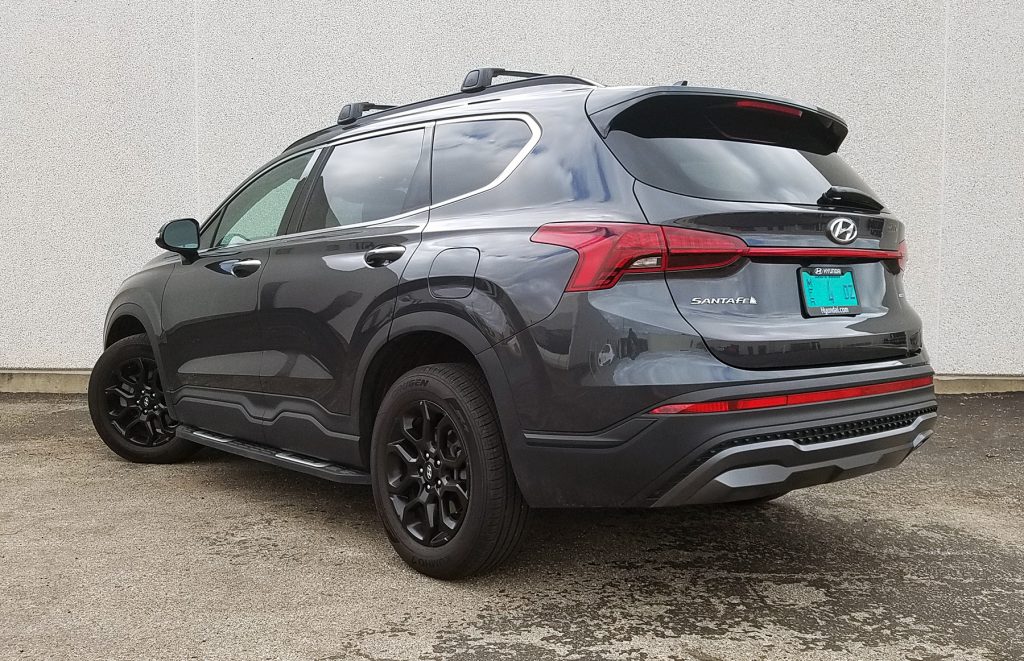
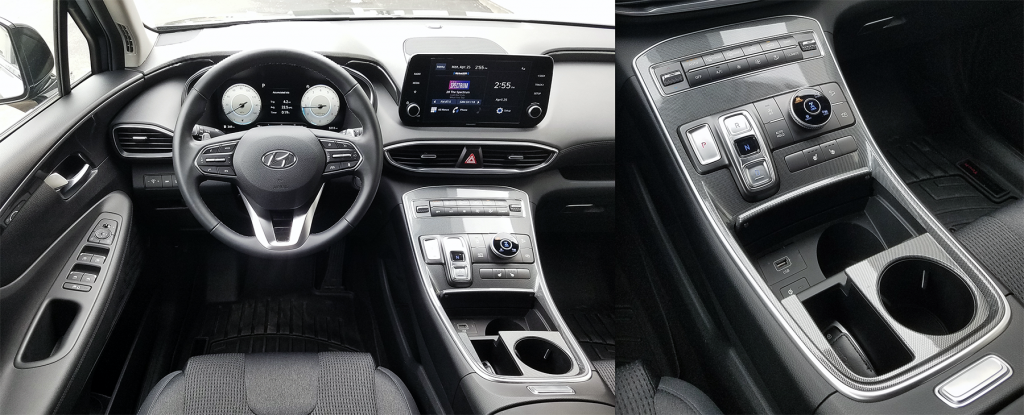
Test Drive Gallery: 2022 Toyota RAV4 Hybrid Limited
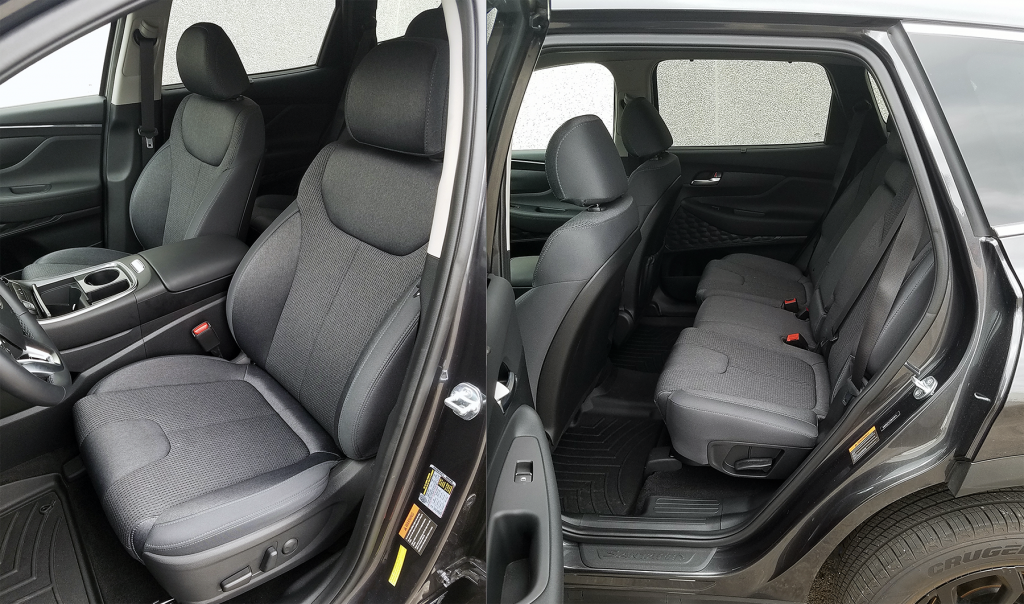
Test Drive: 2022 Honda Passport Trailsport
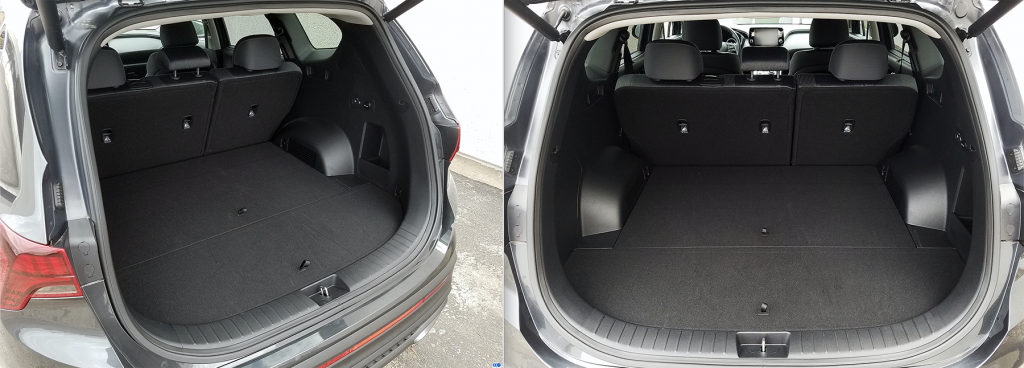
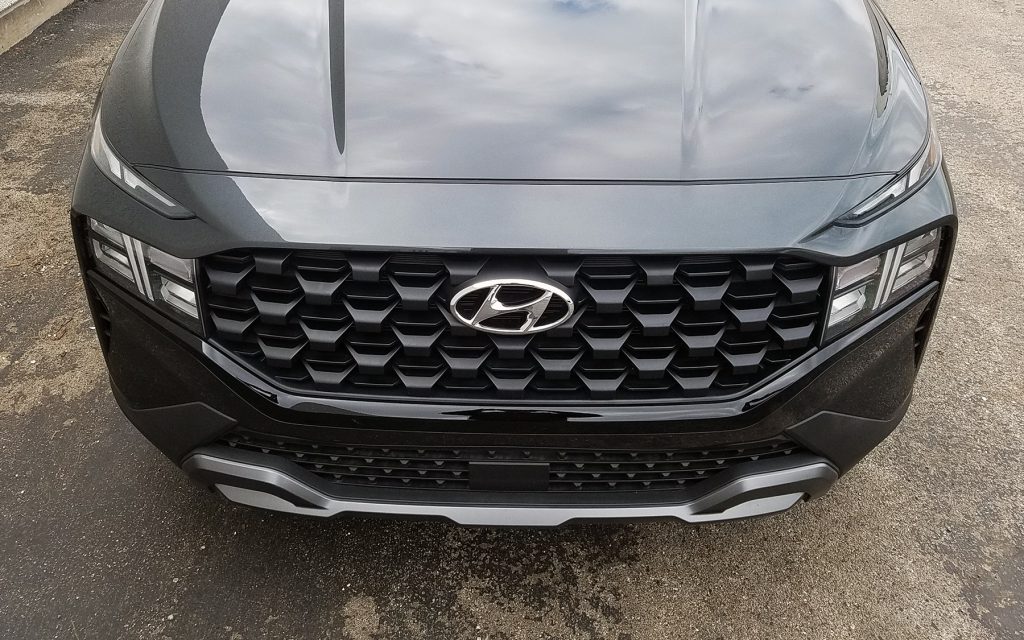
Quick Spin: 2022 Jeep Compass Limited
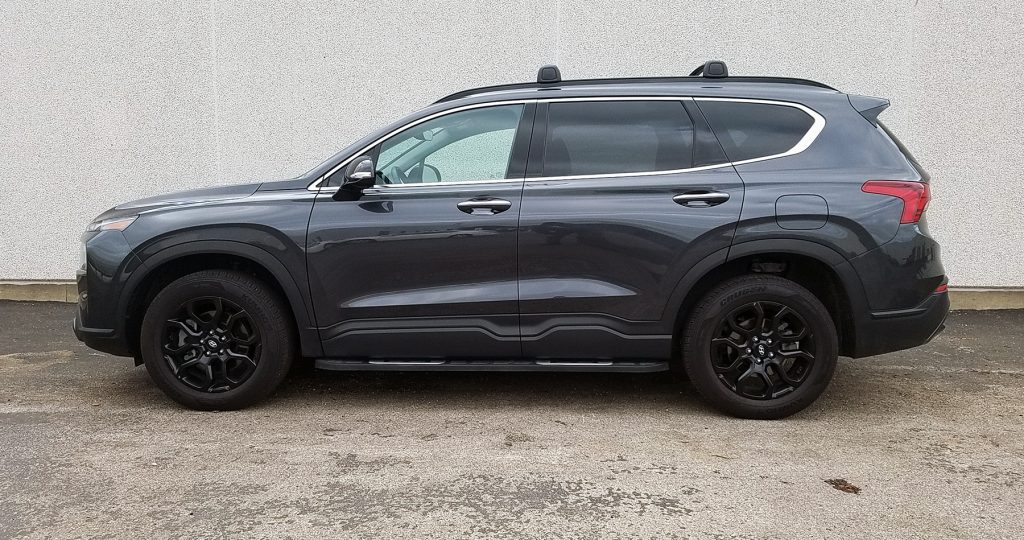
Check out the Consumer Guide Car Stuff Podcast
2022 Hyundai Santa Fe XRT
(Click below for enlarged images)

